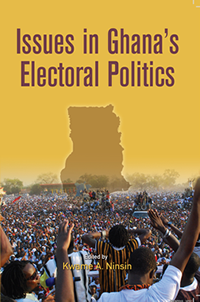Issues in Ghana’s Electoral Politics
Keywords:
Electoral Politics, independence, constitution, new–democratic–framework, citizens, democratic governance, GhanaSynopsis
CODESRIA, Dakar, 2016, 232 p., ISBN 978-2-86978-694-3
Ghana attained independence in 1957. From 1992, when a new constitution came into force and established a new – democratic – framework for governing the country, elections have been organized every four years to choose the governing elites. The essays in this volume are about those elections because elections give meaning to the role of citizens in democratic governance. The chapters depart from the study of formal structures by which the electorate choose their representatives. They evaluate the institutional forms that representation take in the Ghanaian context, and study elections outside the specific institutional forms that according to democratic theory are necessary for arriving at the nature of the relationships that are formed between the voters and their representatives and the nature and quality of their contribution to the democratic process.
Chapters
-
Prelim
-
In Search of ‘Honorable’ Membership: Parliamentary Primaries and Candidate Selection in Ghana
-
Civic Election Observation and General Elections in Ghana under the Fourth Republic: Enhancing Government Legitimacy and the Democratization Process
-
The Regional Balance of Presidential Tickets in Ghanaian Elections: Analysis of the 2008 General Elections
-
Manifestos and Agenda Setting in Ghanaian Elections
-
Elections and Representation in Ghana’s Democracy
-
Impact of Democratic Political Transition on the Economy of Ghana
-
Political Transitions, Electoral Mobilization, and State Institutions
-
Democracy without Development: The Perils of Plutocracy in Ghana
-
Ghana’s 2008 Elections, the Constitution and the Unexpected: Lessons for the Future
-
Index
Downloads
References
Afari Gyan, K., 1995, The Making of the Fourth Republican Constitution of Ghana, Accra: Friedrich Ebert Stiftung.
Danquah Institute, 2010, Securing Africa’s Democracy with e-voting – Ghana’s civil society’s relentless
push for election automation technology, in Danquah Institute Special News- letter, p. 13.
Judicial Service of Ghana, 2012, Manual on Election Adjudication in Ghana, 2nd edition, Accra.
Larvie, J. and K. Afriyie-Badu, 1996, Elections in Ghana, 1996, Part 1, Accra: Electoral Commission of Ghana and Friedrich Ebert Stiftung. New Patriotic Party, 1993, The Stolen Verdict, Accra.
Ninsin, K.A. and F.K. Drah (eds.), 1993, Political Parties and Democracy in Ghana’s Fourth Republic, Accra: Woeli Publications.
Oquaye, M., 2004, Politics in Ghana, 1982-1992: Rawlings, Revolution and Populist Democracy, Accra: Tornado Press.
Smith de, S. A., 1973, Constitutional and Administrative Law, 4th ed., p. 78.






